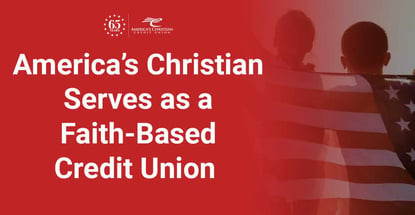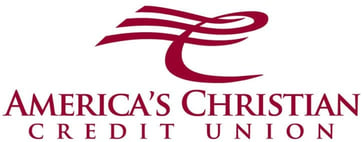
Our experts and industry insiders blog the latest news, studies and current events from inside the credit card industry. Our articles follow strict editorial guidelines.
In a Nutshell: America’s Christian Credit Union is a financial institution that follows biblical principles. It partners with churches to help them secure financing for projects that allow them to best serve their congregations and communities. America’s Christian Credit Union (ACCU) also has a plethora of personal financial products available to its members. ACCU’s members have access to benefits that align with Christian values.
In 1958, five Nazarene pastors were experiencing trouble securing access to credit and other financial products. Banks at that time measured credit-worthiness in a way that was disadvantageous to some pastors and churches.
The pastors surmised that other church leaders were likely experiencing similar difficulties, so they decided to establish a state-chartered credit union in California that would specifically serve pastors. They pulled their meager resources together, and, armed with $135, established the Nazarene Ministers’ Credit Union of California.
America’s Christian Credit Union was formed from these humble beginnings. America’s Christian Credit Union (ACCU) is fully equipped to serve members in all 50 states and outlying territories. It has grown to employ approximately 100 people, and it has tens of thousands of members across the country.

“We are probably one of the most open faith-based credit unions out there,” said Andrew Casanova, ACCU’s Chief Marketing Officer. “We serve almost every Christian mainline faith and pride ourselves in having both Protestants and Catholics represented in our field of membership.”
ACCU focuses on providing financial products and services that meet the various needs of its members. It places an emphasis on following biblical money management principles in all of its business practices.
“Church leaders want to ensure that their finances are above reproach,” Casanova explains. “And they want to make sure that their business dealings align to their faith and traditions. We wholeheartedly believe in that as well and really focus on reinforcing the Christian community.”
Helping Churches Prosper in Their Communities
ACCU excels in the church-financing space. It has grown its commercial real estate portfolio by funding church projects. Churches that are looking to build new houses of worship or expand their current facilities have a partner they can trust in ACCU.
Casanova said ACCU has one of the largest commercial real estate portfolios among credit unions. It prioritizes providing sound financial guidance to churches over profits and works to prepare churches to receive the best financing solutions possible.
“We want to ensure that churches have adequate knowledge of financing products, regardless of whether or not they get their final note from us,” Casanova said. “We steer churches away from non-traditional lending sources, which can have pitfalls, toward traditional financing sources. In addition to us, that includes regional banks that provide commercial real estate for churches.”

There are differences between personal real estate and organizational real estate. ACCU offers organizations a financial assessment resource that helps them understand these differences and prepare for securing financing. ACCU provides an honest assessment of where the organization’s current financial standing is, and listens to the organization’s vision of where they want to be in the future. It then helps the organization develop a plan that will help get them to their desired future state.
“A lot of times, a church’s growth will be at least partially funded by donations,” Casanova details. “A capital campaign can help kickstart fundraising efforts and also provide reserve cash to the church. From there, we’re better situated than banks to understand how churches raise funding and how to estimate their future cash flows.”
ACCU will analyze a church’s donations received over time to better determine the church’s future cash flow outlook. It can also pair the church with a firm to help them establish and manage a capital campaign initiative, depending on the type of project the church is seeking.
ACCU recommends alternative sources of revenue churches can access, if needed. Space-sharing provides an opportunity for churches to sublease their buildings to other churches that don’t have a permanent home. Casanova said churches can also pursue rental income by hosting Christian start-up schools and community-centric events.
“There are a lot of different revenue sources churches can seek that allow them to better utilize their space,” said Casanova. “We help churches identify these sources of income, which provide a more solid financial foundation for the church going forward.”
Innovative Financial Solutions for Members
ACCU also has a robust menu of personal financial products and services available for its members. Membership is open to anyone who’s involved with the churches it partners with or is affiliated with their ministry.
ACCU is primarily an online institution, though it does have one branch, which it refers to as its “corporate store.” Casanova said having a minimal brick-and-mortar presence allows ACCU to offer highly competitive products to its members.
“We run the gamut in terms of our product offerings on the business and personal side,” he details. “We offer all your traditional checking, savings, money market, and term deposits. In terms of term share certificates, independent sources have ranked our rates as either first or second among all credit unions offering products of the same duration.”

ACCU offers members three different credit cards that may suit their unique credit needs. None of the cards assess an annual fee, and two of the cards offer benefits that align with ACCU and its members’ values.
Its middle-tier card allows users to make everyday purchases with pride. ACCU donates a portion of each purchase to a Christian ministry. This feature is especially powerful in that it allows the cardholder to impact charitable giving without actually donating any of their own funds.
ACCU also offers a rewards credit card that earns cardholders points with each purchase. Cardholders earn 1.25 points for each dollar spent. Points can be redeemed for cash back, gift cards, merchandise, or travel. ACCU provides extra motivation to cardholders who use their card to make a charitable donation. It doubles the rewards points to 2.5 points for each charitable donation cardholders make with their rewards credit card.
“In my humble opinion, this is a really generous program,” said Casanova. “As an organization, we believe in charitable giving, and this is an opportunity to bolster the charitable giving of our cardholders. Every dollar donated towards an organization designated as a charity will earn double rewards.”
America’s Christian Promotes Family Financial Health
America’s Christian Credit Union offers products and services that are aimed at strengthening families and providing opportunities for them to flourish, financially and spiritually. One such product is its adoption loan program.
ACCU understands that private adoptions can be cost prohibitive for members. Its adoption loans provide families with the financing necessary to welcome a child into their homes. Casanova said ACCU has supported 2,500 adoptions through the program.

In addition to products and services, ACCU devotes a section of its website to financial education. It also offers a biblically based financial literacy class. Casanova said the class examines how scripture and biblical principles inform money management. ACCU provides the class online for free via a series of videos. Resources that accompany the videos are also available to be downloaded for free.
Individuals who open an account or pursue educational opportunities with ACCU are engaging with an organization whose beliefs align with their personal faith.
“It’s exciting in this day and age that folks are really considering where they’re banking,” said Casanova. “Our members can rest assured that whatever we’re involved in is always in alignment with their faith, traditions, and worldview.”


![What Is Netspend? The Company & Its Products ([updated_month_year]) What Is Netspend? The Company & Its Products ([updated_month_year])](https://www.cardrates.com/images/uploads/2022/10/What-Is-Netspend.jpg?width=158&height=120&fit=crop)

![5 Best Bank of America Cash Back Credit Cards ([updated_month_year]) 5 Best Bank of America Cash Back Credit Cards ([updated_month_year])](https://www.cardrates.com/images/uploads/2023/01/Bank-of-America-Cash-Back-Credit-Cards.jpg?width=158&height=120&fit=crop)
![3 Best Bank of America Credit Cards for Travel ([updated_month_year]) 3 Best Bank of America Credit Cards for Travel ([updated_month_year])](https://www.cardrates.com/images/uploads/2023/03/Best-Bank-of-America-Credit-Cards-For-Travel.jpg?width=158&height=120&fit=crop)
![12 Bank of America Credit Card Limits ([updated_month_year]) 12 Bank of America Credit Card Limits ([updated_month_year])](https://www.cardrates.com/images/uploads/2023/04/Bank-of-America-Credit-Card-Limits.jpg?width=158&height=120&fit=crop)
![5 Bank of America Contactless Credit Cards ([updated_month_year]) 5 Bank of America Contactless Credit Cards ([updated_month_year])](https://www.cardrates.com/images/uploads/2023/05/Bank-of-America-Contactless-Credit-Cards.jpg?width=158&height=120&fit=crop)
![Average Credit Card Debt in America in [current_year] Average Credit Card Debt in America in [current_year]](https://www.cardrates.com/images/uploads/2023/06/CR-AverageCreditCardDebtInAmerica-1250X650.jpg?width=158&height=120&fit=crop)
![7 Bank of America Cards By Credit Score Needed ([updated_month_year]) 7 Bank of America Cards By Credit Score Needed ([updated_month_year])](https://www.cardrates.com/images/uploads/2023/08/Bank-of-America-Cards-By-Credit-Needed.jpg?width=158&height=120&fit=crop)